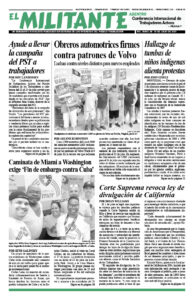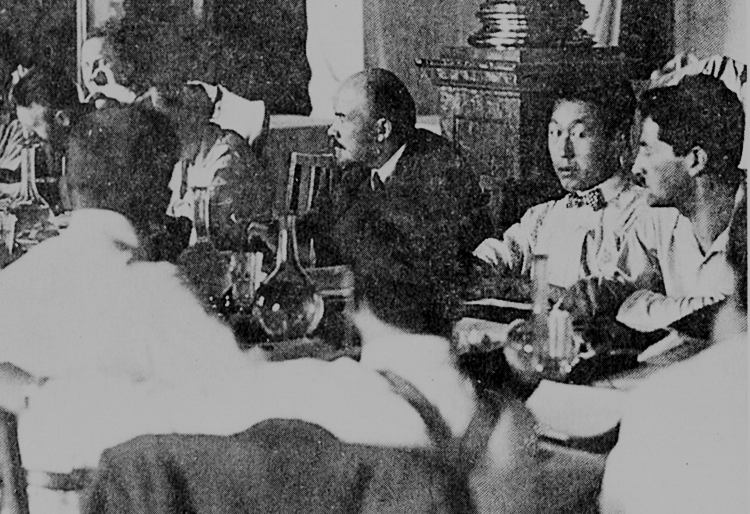One of Pathfinder’s Books of the Month for July is Workers of the World and Oppressed Peoples, Unite! Proceedings and Documents of the Second Congress of the Communist International, 1920 (Volume 1). This excerpt is from a report to the Congress by V.I. Lenin, the central leader of the Bolshevik Party. The Congress was attended by delegates from 37 countries in Europe, Asia, the Americas and Australia. One reason the Bolsheviks were able to lead working people to power in Russia in October 1917 and defeat attempts by imperialist armies to overthrow the new government was because they championed the rights of peoples who were oppressed under the czarist empire, which was a prison house of nations. In his report, Lenin draws on the lessons of that experience to help guide revolutionary parties around the world. Copyright © 1991 by Pathfinder Press. Reprinted by permission.
First, what is the cardinal idea underlying our theses? It is the distinction between oppressed and oppressor nations. Unlike the Second International and bourgeois democracy, we emphasize this distinction. In this age of imperialism, it is particularly important for the proletariat and the Communist International to establish the concrete economic facts and to proceed from concrete realities, not from abstract postulates, in all colonial and national problems.
The characteristic feature of imperialism consists in the whole world, as we now see, being divided into a large number of oppressed nations and an insignificant number of oppressor nations, the latter possessing colossal wealth and powerful armed forces. The vast majority of the world’s population, over a billion, perhaps even 1.25 billion people, or, if we take the total population of the world as 1.75 billion, about 70 percent of the world’s population, belongs to the oppressed nations, which are either in a state of direct colonial dependence or are semicolonies as, for example, Persia, Turkey, and China, or else, conquered by some big imperialist power, have become greatly dependent on that power by virtue of peace treaties. This idea of a division, of dividing the nations into oppressor and oppressed, runs through the theses, not only the first theses published earlier over my signature but also those submitted by Comrade Roy. The latter were framed chiefly from the standpoint of the situation in India and other big Asian countries oppressed by Britain. Herein lies their great importance to us.
The second basic idea in our theses is that in the present world situation following the imperialist war reciprocal relations between peoples, as well as the world political system as a whole, are determined by the struggle waged by a small group of imperialist nations against the soviet movement and the soviet states headed by Soviet Russia. Unless we bear that in mind, we shall not be able to pose a single national or colonial problem correctly, even if it concerns a most outlying part of the world. Only by beginning from this standpoint can the Communist parties in civilized and backward countries alike pose and solve political problems correctly.
Third, I should like especially to emphasize the question of the bourgeois-democratic movement in backward countries. … [W]e have arrived at the unanimous decision to speak of the national-revolutionary movement rather than of the “bourgeois-democratic” movement. It is beyond doubt that any national movement can only be a bourgeois-democratic movement, since the overwhelming mass of the population in the backward countries consists of peasants, who represent bourgeois-capitalist relationships. It would be utopian to believe that proletarian parties in these backward countries, if indeed they can emerge in them, can pursue communist tactics and a communist policy without establishing definite relations with the peasant movement and without giving it effective support.
However, the objection has been raised that if we speak of the bourgeois-democratic movement we shall be obliterating all distinctions between the reformist and the revolutionary movements. Yet that distinction has been very clearly revealed of late in the backward and colonial countries, since the imperialist bourgeoisie is doing everything in its power to implant a reformist movement among the oppressed nations too. There has been a certain rapprochement between the bourgeoisie of the exploiting countries and that of the colonies, so that very often — perhaps even in most cases — the bourgeoisie of the oppressed countries, while it does support the national movement, is in full accord with the imperialist bourgeoisie, that is, joins forces with it against all revolutionary movements and revolutionary classes. This was irrefutably proven in the commission, and we decided that the only correct attitude was to take this distinction into account and, in nearly all cases, substitute the term national-revolutionary for the term bourgeois-democratic.
The significance of this change is that we, as Communists, should and will support bourgeois liberation movements in the colonies only when they are genuinely revolutionary, and when their exponents do not hinder our work of educating and organizing in a revolutionary spirit the peasantry and the masses of the exploited. …
Next, I would like to make a remark on the subject of peasants’ soviets. The Russian Communists’ practical activities in the former tsarist colonies, in such backward countries as Turkestan, and so forth, have confronted us with the question of how to apply communist tactics and policy in precapitalist conditions. The preponderance of precapitalist relationships is still the main determining feature in these countries, so that there can be no question of a purely proletarian movement in them. There is practically no industrial proletariat in these countries. Nevertheless, we have assumed, we must assume, the role of leader even there. Experience has shown us that tremendous difficulties have to be surmounted in these countries. However, the practical results of our work have also shown that despite these difficulties we are in a position to inspire in the masses an urge for independent political thinking and independent political action, even where a proletariat is practically nonexistent.


